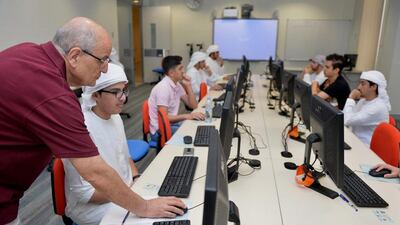AL AIN // UAE University will admit non-Emirati undergraduate students for the first time since it was founded in 1976.
The move by the country’s first university has been welcomed by experts, who said diversity would be good for the institution – which was placed in the top 50 universities in the Times Higher Education rankings since 2013 – and its students.
Prof Mohamed Albaili, provost of the university, said there were many advantages to the change.
“The academic experience of UAEU national students can be greatly enhanced by interaction with international students,” he said.
“They bring with them an international perspective, diversity of ideas and experience, which fuel innovation. In addition, there are very clear pedagogical benefits to having international students in the classroom.
“Their presence enriches class discussions, since the students share their experiences and stories from a different culture. It can also help remove stereotypes.”
With expatriate students paying for four-year degrees costing from Dh288,000 for a humanities degree to Dh441,000 for an engineering degree – on par with the likes of the American University of Sharjah – the extra income will benefit the university, which like other institutions struggle to compete for limited research funding.
“The income will support the university’s budget to be able to fund the development of new programmes, labs, and libraries,” said Prof Albaili. He hoped integration of the new students will run smoothly. The university has taken steps to arrange briefings, and set up specialist advisers, orientation and activities to ensure that the process runs smoothly.
Dr Senthil Nathan, director and co-founder of Edu Alliance, an education consultancy in Abu Dhabi, lauded the changes.
“Enrolling international students would bring a new dimension of competition to the student population, help expand UAEU’s footprint across the region and may serve as another measure for its growing reputation for quality,” said Dr Nathan.
He said it was important to prioritise the Emirati students whom the university was founded to serve.
“Given the mandate of UAEU to serve Emirati students primarily, it is important to keep the international enrolment small but enough so that this does not adversely impact its mandate to educate the Emirati students,” he said.
Prof Tod Laursen, president of Khalifa University, agreed with Dr Nathan.
His university is public, run by Abu Dhabi Education Council but not the federal government, and accepts non-Emiratis.
“Having international students in the classroom has a huge effect on classroom experience and the quality of education all students receive,” he said.
UAEU is not the first federal university to take such a step. In 2010 Zayed University became the first federal university to admit international students, although their numbers are still small, at 334 out of 8,800 students.
mswan@thenational.ae

